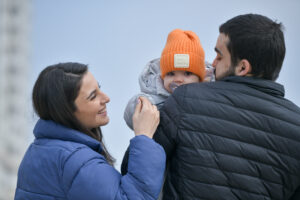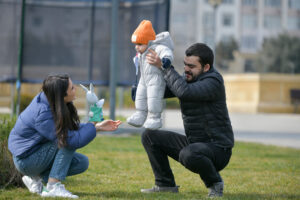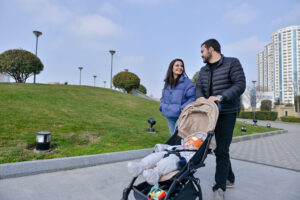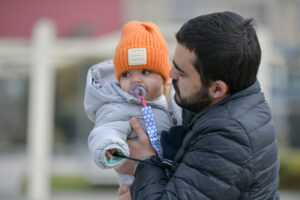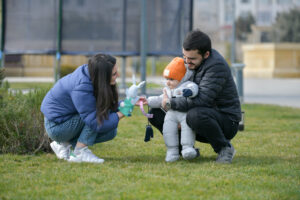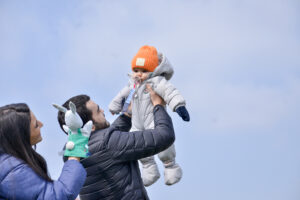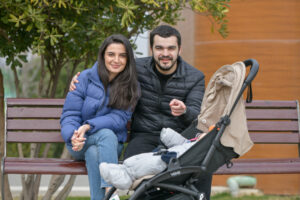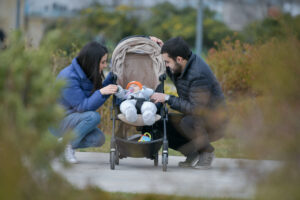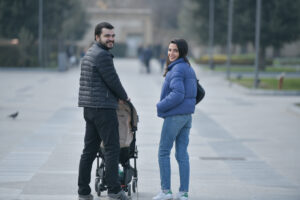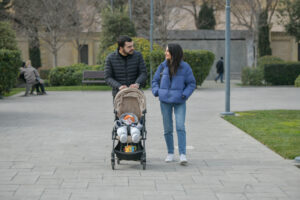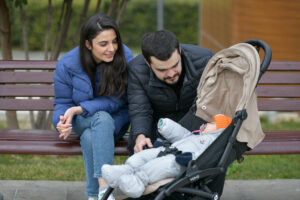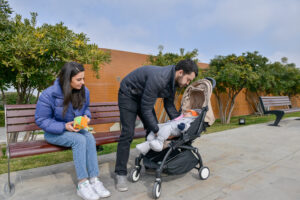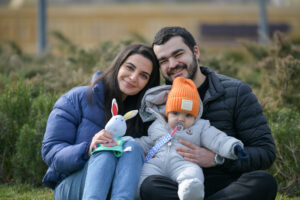
Trapped by stereotypes: how can a father avoid becoming a stranger to his own child?
In many families in Azerbaijan, men are completely absent from their children’s upbringing. Often, fathers know nothing of the habits, interests, and desires of their own children, ignoring how they live and what they dream about, what gift they’d like for their birthday, the things they like talking about.
Society in Azerbaijan remains very conservative. Childcare is traditionally considered a woman’s task. As a result, children receive less attention from their fathers: according to the UN Population Fund, in 2021, only 21% of fathers in Azerbaijan participated in the education of their children, 13% in their upbringing and 14% in other aspects of a child’s life. At the same time, psychologists say that the stronger the bonds between father and baby, the better their relationship will be in the future, with the child feeling more confident and having higher self-esteem.
Young parents Javid Tahirli and Ilaha Bakhyshova-Tahirli from Baku are an example of a modern Azerbaijani family trying to break with such stereotypes. The relationship between the spouses is built on love and mutual respect, and in the life of their 7-month-old daughter Darya, mum and dad are equally present.
“This is quite natural for me, since this is the attitude, I have seen since childhood in my family. Our parents paid a lot of attention to us,” says Javid.
“My father was always strict, but fair and loving. He always had time for my sister and me. He helped with advice, but didn’t impose his choices,” adds Javid, who now projects the same behaviour on his own family. He is sure that gender equality is the basis for every other type of equality in society.
Even though their daughter is still very young, and her life mostly revolves around food, sleep and short games, the young father is happy to take a full part in her life. Changing a nappy, lulling, or walking with his daughter is not a problem for Javid. The baby feels as calm and comfortable in her father’s arms as with her mother.
What’s more, Javid has his own little tricks, like how to put Darya easily and quickly to bed. “When I see that my daughter is sleepy and I put her in the crib, she immediately starts to get active, to play. I think this situation is familiar to many,” he says with a smile. “I found my way – I just lie down next to her and put my hand on her knees. I noticed that she likes it, she slowly begins to calm down and falls asleep,” says Javid. “This method doesn’t work for me with Darya,” Ilaha adds, laughing.
Ilaha greatly appreciates her husband equally sharing the responsibilities in taking care of the child. Such support helped her to quickly return to work after her four-month maternity leave. “Changing a diaper, changing clothes, feeding and so on is not the main thing that a child needs from a dad. The role of the father is much deeper and more important. Emotional connection, participation is very important, this is what I call positive parenting, and I really appreciate such a responsible attitude from my husband,” she says.
When they were expecting their child, the Tahirlis were ready for either a boy or a girl. However, Javid now admits that perhaps he is so emotionally attached to his child precisely because she is a girl. Yet for those parts of society where outdated stereotypes remain strong, the birth of a girl is still not considered good news.
Javid and Ilaha wish all young people in Azerbaijan to step beyond the stereotypes, to build a family solely out of love, not to succumb to ideas imposed from the outside, and to have children only when they feel ready for it.
Javid Tahirli was one of 120 participants in the recently completed project “School for Dads – Transformation of Responsible Fatherhood” (Papa Schools) for future and young fathers. The main goal of this EU-funded project was to promote gender equality in the family, as well as the involvement of dads in the process of upbringing and development of children.
This two-month project was one of the elements of the larger programme “EU for Gender Equality: Together against Gender Stereotypes and Gender Violence” (EU4Gender Equality), and was implemented in Azerbaijan by the Gender Hub platform with the support of UN Women and the UN Population Fund (UNFPA). The EU-funded project promotes equal rights and opportunities for women, fights gender stereotypes, and encourages men’s participation in childcare and other household chores.
Javid became the winner of the Papa Schools project in the “Best Father” nomination, thanks to his active participation in classes and progressive view of fatherhood.
The project was implemented in Baku, Ganja and Gazakh. According to Roman Gojayev, project manager from Gender Hub, Baku and Ganja were chosen as the cities where the largest number of gender-based crimes are recorded. The small town of Gazakh near the Azerbaijani-Georgian border was included in the project as one of the most remote cities from the capital, where there are also problems of gender inequality and where such initiatives are few and far between.
Roman Gojayev admits that difficulties arose both in the participants’ recruitment process and during the seminars themselves. He points to the patriarchal foundations and gender stereotypes rooted in society as the main reason. This is particularly true outside the capital. “It was not easy to recruit participants. Men, as a rule, avoid such events, and public discussion of topics related to family and children is considered unacceptable. It was especially difficult in the countryside,” says Roman Gojayev, noting that even the word ‘gender’ is misunderstood by many.
“But we look at the difficulties from the positive side – it means that those few who decided to take part in the project are really set up for change and want to be good parents. It was not so much about quantity, what mattered for us more was the quality,” he says.
The events were held on Saturdays and Sundays, both in the format of seminars with open discussions and in the format of joint interactive meetings for dads and children, games, and competitions. For some meetings, the project invited psychologists, paediatricians and lawyers specialising in working with families.
“Although our project was called ‘School for Dads’, the meetings were not like a classic lesson. We weren’t trying to teach anyone anything in the literal sense of the word. This would not bring a positive result, and might even have the opposite effect. On the contrary, our participants were part of the process, and ideas arose from the discussions,” says Roman Gojayev.
He believes that the participants of the school for dads now know how to build relationships in the family upon mutual respect and love, without pressure and restrictions; they understand that a father’s participation in the life of his child is not something shameful, but, on the contrary, an important element in building the child’s personality.
“Even a slight shift in the consciousness of a small number of people is of great importance,” says Roman Gojayev.
Author: Elena Ostapenko
Article published in Azerbaijani and Russian by 1news.az
MOST READ
RELATED PROJECTS
SEE ALSO

No, time is not on Russia‘s side
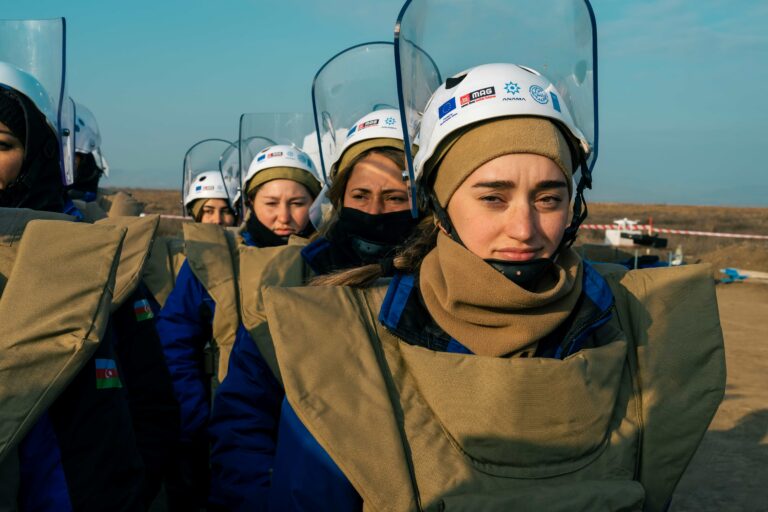
I have no regrets: the Azerbaijani women trained to clear mines
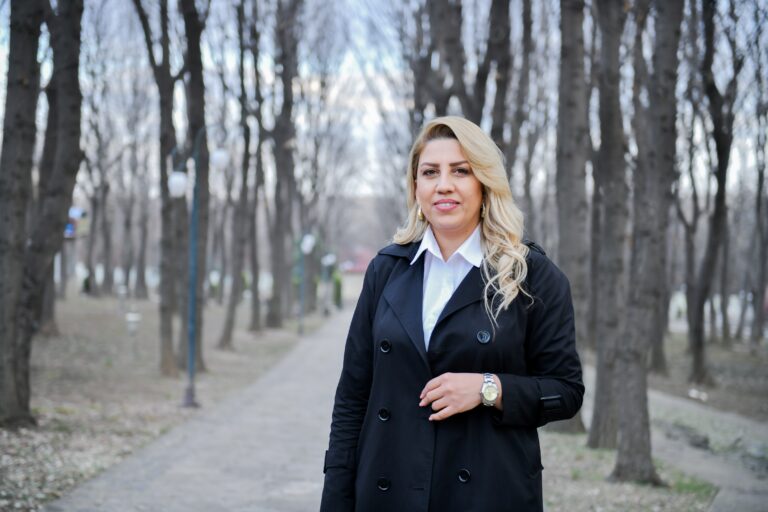
Turning a hobby into business: how Vusala Akhmadova from Tovuz helps women and children develop

Be one step ahead of a hacker: check simple cybersecurity tips!
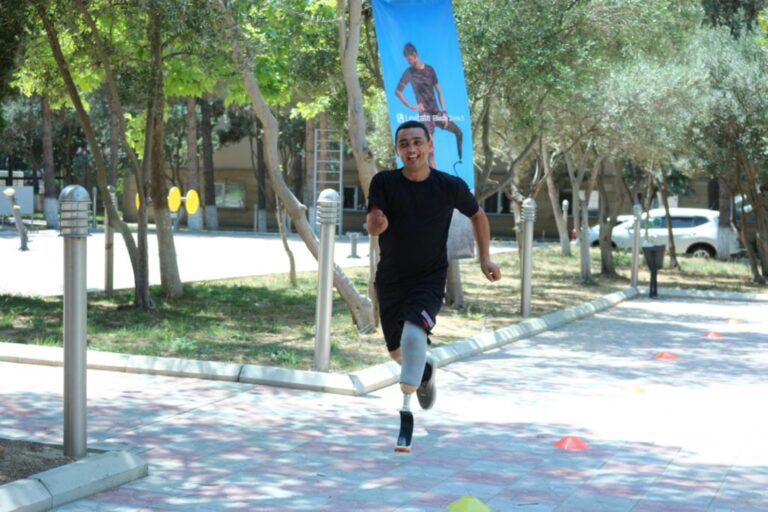
A chance for a better life: restoring justice for people with disabilities in Azerbaijan
More campaign pages:
Interested in the latest news and opportunities?
This website is managed by the EU-funded Regional Communication Programme for the Eastern Neighbourhood ('EU NEIGHBOURS east’), which complements and supports the communication of the Delegations of the European Union in the Eastern partner countries, and works under the guidance of the European Commission’s Directorate-General for Neighbourhood Policy and Enlargement Negotiations, and the European External Action Service. EU NEIGHBOURS east is implemented by a GOPA PACE-led consortium. It is part of the larger Neighbourhood Communication Programme (2020-2024) for the EU's Eastern and Southern Neighbourhood, which also includes 'EU NEIGHBOURS south’ project that runs the EU Neighbours portal.

The information on this site is subject to a Disclaimer and Protection of personal data. © European Union,
